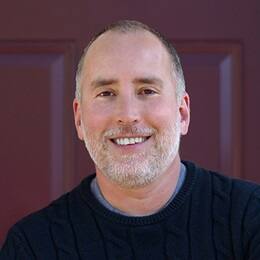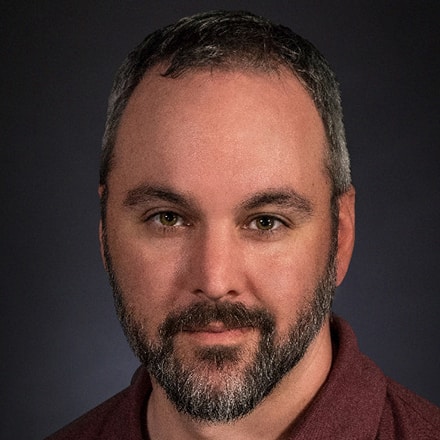Academic Spotlight: Associate Vice President of Academics Anthony Siciliano

Anthony Siciliano is an associate vice president of academic programs at Southern New Hampshire University. Before working in higher education, he was a digital imaging editor and graphic designer as well as a professional photographer and digital artist.
He earned his Bachelor of Fine Arts with an emphasis in photography from Weber State University and an MFA in Photography from Arizona State University. He also holds a Certificate in Teacher Education Development and Student Success from Indiana University and a Certificate in Negotiation and Leadership from Harvard University.
Recently, Siciliano answered questions about his professional background, the importance of education, how he connects with online students and more.
Can you tell us about your professional background?
Previously to my career in higher education, I worked full time as a digital imaging editor and graphic designer, and also as a practicing artist in the mediums of photography, printmaking, collage and digital art. I also did freelance work as a photographer of weddings, headshots, and special events (which I did not enjoy, but paid the bills).
What first drew you to higher education?
I am a first generation college student and I struggled throughout my undergraduate degree with adjusting to the pace and rigor of academic life.
After graduation, I was asked to teach "Introduction to Art and Beginning Photography" by my college mentor after a position opened up at my alma matter. I saw many of my students experience the same roadblocks I encountered when I transitioned to college. At this point, I realized how much I enjoyed working with students and decided teaching was a professional pathway I wanted to follow.
What aspects of your own education have been influential in shaping your career in academia?
Like many students, I had difficulty deciding what I wanted to do for a career and what program would be best for me. I had several different majors in college and it took me about seven years to finish my bachelor’s degree. My experiences helped define my teaching by treating every student with respect and empathy for their unique situations.
Many students were told that they did not belong in college. My philosophy was to help students succeed no matter what their circumstances were in life or what they were told they could or could not do.
What attracted you to this field of study? What keeps you excited about it?
I experimented with art and photography in high school but did not think I could make it a career. After taking a couple of fine art college courses as electives, I found my love and passion for creativity while also discovering a practical application of my skills to graphic design. It was and is hard work balancing my creative pursuits with full time teaching and administrative work, but I love every minute of it.
How have you found ways to effectively connect with students?
I never believed in teaching as an experience of asking students to regurgitate information back to me. I shared my professional experiences with my students (both good and bad) which allowed them to relate to me as a person.
I highly encourage students to experiment with different mediums and techniques as a way of finding their voice in their work. These things allow me to connect on a different level with my students.
What brings you the greatest joy in your work as an associate vice president?
I love to solve complex problems through research, evidence-based learning and experimentation. My work in higher education administration affords me these opportunities through program design and development, implementing high impact practices, faculty development, and collaborating with the many wonderful academic leaders at SNHU.
What do you feel is unique about the faculty and students you work with?
Before coming to SNHU, many of the students have been told that they do not belong or that they cannot be successful in college because of a variety of reasons (they work full time, they have kids, they don’t have the time, etc.). Many students have to break these ways of thinking so they can focus on achieving their degree.
Our faculty understand this mindset and work with our students to overcome these challenges.
What does SNHU’s mission to transform the lives of learners mean to you
Achieving success in higher education represents opening up a path for your family and loved ones that they never saw possible. When one person receives their degree, relatives and friends see that it is possible and they can do it too.
The mantra “you belong here” is not just a saying to me. It is a philosophy that drives SNHU to do what we do. I haven’t found this same philosophy at many of the places I have worked for in the past.
Outside of work, what’s something you’re passionate about or really enjoy doing?
I really enjoy animals. I have two dachshund-mix dogs and they constantly amaze me with their individual personalities and quirks. When I retire, I would love to operate or volunteer at an animal rescue home.
A degree can change your life. Choose your program from 200+ SNHU degrees that can take you where you want to go.
Joe Cote is a writer and organic marketer at Southern New Hampshire University (SNHU), where he has worked since 2016. Previously he spent more than a dozen years as a reporter and editor at weekly and daily newspapers in Vermont and New Hampshire. He lives near SNHU's Manchester, New Hampshire campus with his wife and daughter. Connect with him on LinkedIn.
Explore more content like this article

AI in Education: How Technology is Shaping the Future of Learning

Associate Degree vs. Bachelor's Degree: What's the Difference?

How to Get a Scholarship (And Why It Matters If You Do)
About Southern New Hampshire University

SNHU is a nonprofit, accredited university with a mission to make high-quality education more accessible and affordable for everyone.
Founded in 1932, and online since 1995, we’ve helped countless students reach their goals with flexible, career-focused programs. Our 300-acre campus in Manchester, NH is home to over 3,000 students, and we serve over 135,000 students online. Visit our about SNHU page to learn more about our mission, accreditations, leadership team, national recognitions and awards.


